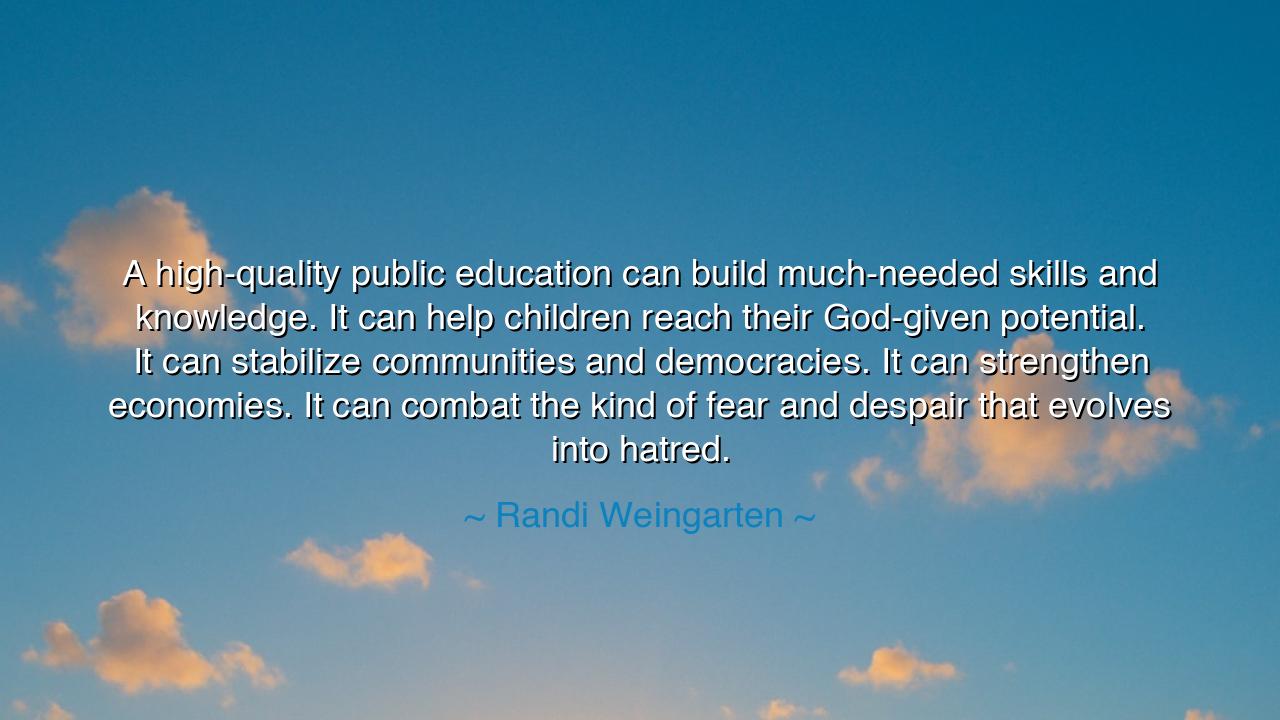
A high-quality public education can build much-needed skills and
A high-quality public education can build much-needed skills and knowledge. It can help children reach their God-given potential. It can stabilize communities and democracies. It can strengthen economies. It can combat the kind of fear and despair that evolves into hatred.






In the wise and impassioned words of Randi Weingarten, a guardian of learning and advocate for teachers, we find a truth as ancient as civilization itself: “A high-quality public education can build much-needed skills and knowledge. It can help children reach their God-given potential. It can stabilize communities and democracies. It can strengthen economies. It can combat the kind of fear and despair that evolves into hatred.” These words resound like a call to remembrance — a reminder that education is not merely a tool for personal advancement, but the very foundation upon which free societies and compassionate hearts are built.
The origin of this quote arises from Weingarten’s lifelong dedication to teaching and leadership within the American Federation of Teachers. In her words, she speaks not only as a union leader but as a philosopher of the civic soul. Her belief in public education is not bureaucratic; it is spiritual and moral. She understands that schools are not factories of information but sanctuaries of transformation, where young minds learn not just how to live, but why. Her statement reflects the ancient conviction — shared by philosophers, prophets, and reformers — that ignorance is the root of tyranny, and that knowledge, rightly cultivated, is humanity’s shield against fear and corruption.
From the dawn of nations, the wisest have known that education is the guardian of liberty. The great Athenian democrats understood this when they taught that a people ignorant of philosophy and reason would soon bow before demagogues. Thomas Jefferson, too, wrote that “a well-informed citizenry is the best defense against tyranny.” And so it remains. Weingarten’s vision, clothed in the language of modern democracy, carries the same timeless heartbeat: that every child, regardless of birth or wealth, must have access to learning — not as a privilege, but as a sacred right. For when knowledge is withheld, power becomes the domain of the few, and justice withers in the hands of ignorance.
When she speaks of helping children reach their God-given potential, she touches upon a truth beyond the political and into the divine. For within every child lies a spark — the potential for wisdom, compassion, and greatness — waiting to be kindled by the patient flame of a teacher’s care. Consider the story of Booker T. Washington, who was born into slavery and yet, through the light of education, rose to become one of America’s great educators and thinkers. His transformation was not his alone; it was the fulfillment of a principle that echoes through Weingarten’s words: that education releases the human spirit from bondage — whether that bondage be ignorance, fear, or despair.
Weingarten also reminds us that public education is the anchor of community and democracy. A school is not simply a building of stone and chalk; it is the heart of a neighborhood, where the rhythms of civic life begin. It teaches cooperation, respect, and shared purpose. Through classrooms, children learn not only how to read, but how to live with one another. History shows us that when education falters, division festers. When the light of learning dims, the shadows of fear grow long. And fear, left unchallenged, becomes hatred. In this way, every classroom becomes a frontline in the battle for the soul of a nation.
To speak of education as an antidote to hatred is to understand its deepest purpose. The uneducated mind is easily swayed by lies, easily frightened by difference. But the educated heart learns to question, to empathize, to imagine life through another’s eyes. This is why tyrants have always feared teachers — why dictators burn books and silence scholars. For they know that knowledge awakens freedom, and freedom awakens the courage to resist injustice. A nation that neglects its schools does not merely risk economic decline; it risks moral decay. For ignorance breeds fear, and fear, as Weingarten warns, evolves into despair and hatred — the twin poisons of civilization.
So let this be the lesson for all who hear these words: cherish education as you would cherish liberty itself. Defend the schools, uplift the teachers, and honor the children who are the keepers of tomorrow. If you are a parent, nurture curiosity in your child. If you are a citizen, support the systems that keep learning alive. And if you are a leader, remember that no wall, army, or fortune can protect a nation built on ignorance. True strength lies not in might, but in the minds of its people — in their wisdom, empathy, and shared pursuit of truth.
For as Randi Weingarten so powerfully reminds us, education is not simply the key to opportunity — it is the cornerstone of peace. It builds skills, yes, but more than that, it builds souls capable of compassion. It is the torch that dispels fear, the bridge that binds communities, and the seed from which both prosperity and justice grow. Let us, then, as the ancients would say, guard the flame of knowledge with all our hearts — for upon it rests the hope of humankind.






AAdministratorAdministrator
Welcome, honored guests. Please leave a comment, we will respond soon